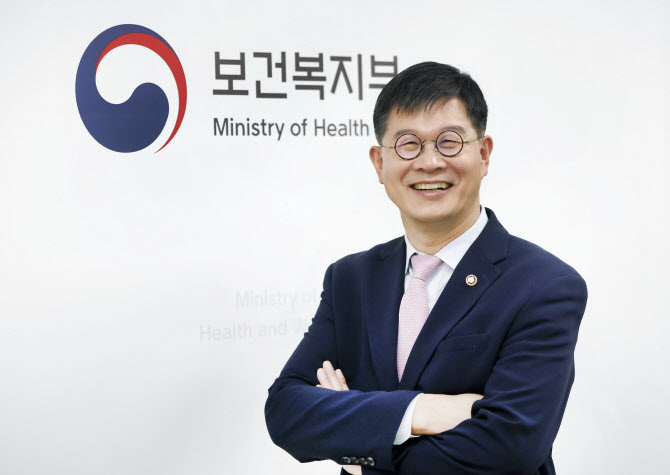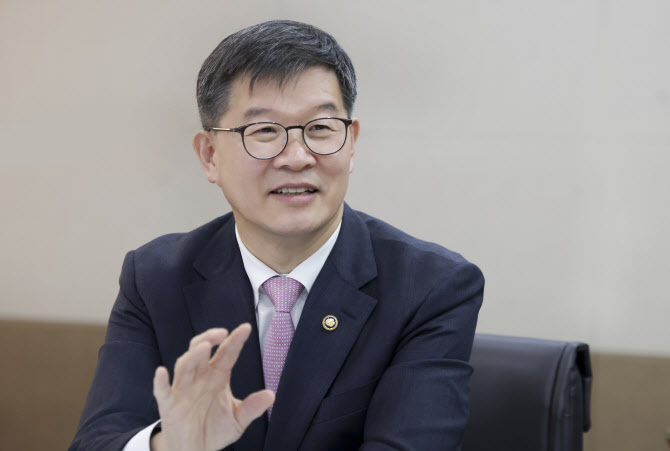포럼뉴스
“Poverty, Illness, Loneliness…Tackiling 3 major challenges of aging”[ESF2025]
입력시간 | 2025.06.04 12:30 | 공지유 기자 noticed@edaily.co.kr
⑪Gi-il Lee, 1st Vice Minister of Health and Welfare
Korea’s elderly poverty rate 38.2%, highest among OECD
Income security through pension reform and basic pension
Expanding high-quality private-sector jobs for seniors
Korea’s elderly poverty rate 38.2%, highest among OECD
Income security through pension reform and basic pension
Expanding high-quality private-sector jobs for seniors
[Jiyu Kong, Edaily Reporter] “We will continue to strengthen policy support to alleviate the 3 main hardships of old age - poverty, illness, and loneliness.”
In a written interview with Edaily, Gi-il Lee, 1st Vice Minister of Health and Welfare, emphasized the need for institutional support, noting, “It took only 7 years for Korea to transition from an aging to a super-aged society, the fastest pace among advanced nations, compared to Sweden (47 years), Germany (37 years), and Japan (11 years).”
Lee, a seasoned welfare expert who has held key posts within the ministry, was promoted to second vice minister in May 2022 and became first vice minister 5 months later, overseeing welfare and population policy. He will speak at the 16th Edaily Strategy Forum (June 18~19th, Shilla Hotel, Seoul) on the government’s policy role in addressing the challenges of low birthrates and population aging.
◇Korea’s Elderly Poverty Rate Is the Highest among OECD
Korea’s elderly population surpassed 10 million in July last year. The number of those aged 75 and older more than doubled from 1.95 million in 2010 to 4.1 million in 2023. The number of elderly living alone also jumped from 990,000 to 2.2 million over the same period. As aging accelerates, the need for robust welfare systems grows.
“To prevent elderly poverty, the government is advancing pension reform, basic pension, and senior employment programs; for illness, we’re providing integrated medical, nursing, and care support as well as long-term care insurance; and for loneliness, we’re strengthening the social safety net so seniors can age comfortably at home,” Lee explained, describing a tailored policy approach to the 3 main hardships facing seniors.
Due to these efforts, Korea’s relative elderly poverty rate eased to 38.2% in 2023, but remains the highest among OECD countries. The relative poverty rate refers to the proportion of elderly whose income is below 50% of the median.
“While the introduction of the basic pension has helped, it’s regrettable that our elderly poverty rate is still so high compared to other countries,” Lee said. “The government will continue to strengthen the basic pension and senior job support systems to alleviate poverty and ensure stable retirement incomes.” According to the ministry, basic pension recipients increased from 4.35 million in 2014 to 7.36 million this year, and the monthly benefit rose from 200,000 won to 343,000 won per person.
Senior jobs have also surged, from 25,000 in 2004 to over 1.09 million this year. The government plans to provide a record 1.1 million jobs for seniors in 2024, covering about 10.4% of the elderly population. However, over 60% of these jobs are still public-interest positions focused on simple labor. “We aim to maintain a reasonable level of public-interest jobs to support low-income and vulnerable seniors, especially those over 75 or in rural areas where private-sector jobs are lacking,” Lee explained.
Going forward, the government plans to expand higher-paying social service and private-sector jobs for seniors. “As the baby boomer generation (born 1955~1963) enters old age, we’ll increase opportunities for them to use their experience and skills in social service and private-sector jobs,” Lee said. The goal is to raise the share of such jobs from 37% to over 40% by 2027.
Lee also stressed the need to protect and support seniors at risk of poverty or isolation by expanding outreach and linking them to health and welfare services.
◇“No Gaps in Elderly Support... Ensuring Seamless Integrated Care”
From March next year, the government will launch the Integrated Care Support Act, a regionally tailored model to provide seamless care for seniors. This initiative will allow local governments to coordinate medical, nursing, and daily living support so that seniors can receive care at home or in their communities. According to a recent survey, 79% of adults over 40 want to receive care at home or in their local area when needed.
“Seniors want to continue receiving medical and care services at home after hospital treatment,” Lee said. “We’re building a delivery system that provides integrated, personalized support through local governments.” The ministry plans to expand the integrated care model from 100 pilot regions to all 229 local governments nationwide.
With the recent passage of pension reform in the National Assembly, there are calls to accelerate follow-up measures. “The National Assembly’s special pension committee is expected to discuss further steps, including fiscal stabilization and building a multi-layered retirement income system,” Lee said.
“Introducing automatic adjustment mechanisms and structural reforms must be considered in terms of fiscal sustainability, income security in old age, and public acceptance, and should be achieved through social consensus,” he added. “The government will actively participate and support in-depth discussions in the National Assembly.”
◇About Lee Ki-il…
△Bachelor’s in Public Administration, Konkuk University, △Master’s in Public Policy, University of Oregon, △Ph.D. in Public Health, Inje University, △Passed the 37th National Civil Service Exam, △Former Spokesperson, Director of Health Policy, Director of Health Insurance Policy, Director General for Health Policy, Second Vice Minister, and First Vice Minister, Ministry of Health and Welfare
In a written interview with Edaily, Gi-il Lee, 1st Vice Minister of Health and Welfare, emphasized the need for institutional support, noting, “It took only 7 years for Korea to transition from an aging to a super-aged society, the fastest pace among advanced nations, compared to Sweden (47 years), Germany (37 years), and Japan (11 years).”
Lee, a seasoned welfare expert who has held key posts within the ministry, was promoted to second vice minister in May 2022 and became first vice minister 5 months later, overseeing welfare and population policy. He will speak at the 16th Edaily Strategy Forum (June 18~19th, Shilla Hotel, Seoul) on the government’s policy role in addressing the challenges of low birthrates and population aging.
|
Korea’s elderly population surpassed 10 million in July last year. The number of those aged 75 and older more than doubled from 1.95 million in 2010 to 4.1 million in 2023. The number of elderly living alone also jumped from 990,000 to 2.2 million over the same period. As aging accelerates, the need for robust welfare systems grows.
“To prevent elderly poverty, the government is advancing pension reform, basic pension, and senior employment programs; for illness, we’re providing integrated medical, nursing, and care support as well as long-term care insurance; and for loneliness, we’re strengthening the social safety net so seniors can age comfortably at home,” Lee explained, describing a tailored policy approach to the 3 main hardships facing seniors.
Due to these efforts, Korea’s relative elderly poverty rate eased to 38.2% in 2023, but remains the highest among OECD countries. The relative poverty rate refers to the proportion of elderly whose income is below 50% of the median.
“While the introduction of the basic pension has helped, it’s regrettable that our elderly poverty rate is still so high compared to other countries,” Lee said. “The government will continue to strengthen the basic pension and senior job support systems to alleviate poverty and ensure stable retirement incomes.” According to the ministry, basic pension recipients increased from 4.35 million in 2014 to 7.36 million this year, and the monthly benefit rose from 200,000 won to 343,000 won per person.
|
Going forward, the government plans to expand higher-paying social service and private-sector jobs for seniors. “As the baby boomer generation (born 1955~1963) enters old age, we’ll increase opportunities for them to use their experience and skills in social service and private-sector jobs,” Lee said. The goal is to raise the share of such jobs from 37% to over 40% by 2027.
Lee also stressed the need to protect and support seniors at risk of poverty or isolation by expanding outreach and linking them to health and welfare services.
◇“No Gaps in Elderly Support... Ensuring Seamless Integrated Care”
From March next year, the government will launch the Integrated Care Support Act, a regionally tailored model to provide seamless care for seniors. This initiative will allow local governments to coordinate medical, nursing, and daily living support so that seniors can receive care at home or in their communities. According to a recent survey, 79% of adults over 40 want to receive care at home or in their local area when needed.
“Seniors want to continue receiving medical and care services at home after hospital treatment,” Lee said. “We’re building a delivery system that provides integrated, personalized support through local governments.” The ministry plans to expand the integrated care model from 100 pilot regions to all 229 local governments nationwide.
With the recent passage of pension reform in the National Assembly, there are calls to accelerate follow-up measures. “The National Assembly’s special pension committee is expected to discuss further steps, including fiscal stabilization and building a multi-layered retirement income system,” Lee said.
“Introducing automatic adjustment mechanisms and structural reforms must be considered in terms of fiscal sustainability, income security in old age, and public acceptance, and should be achieved through social consensus,” he added. “The government will actively participate and support in-depth discussions in the National Assembly.”
◇About Lee Ki-il…
△Bachelor’s in Public Administration, Konkuk University, △Master’s in Public Policy, University of Oregon, △Ph.D. in Public Health, Inje University, △Passed the 37th National Civil Service Exam, △Former Spokesperson, Director of Health Policy, Director of Health Insurance Policy, Director General for Health Policy, Second Vice Minister, and First Vice Minister, Ministry of Health and Welfare
© 종합 경제정보 미디어 이데일리 - 상업적 무단전재 & 재배포 금지
포럼사진
준비중입니다.
포럼영상
준비중입니다.

